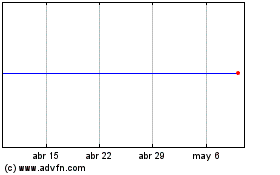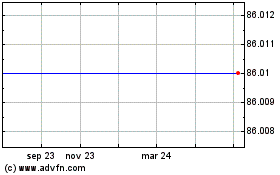Honeywell Reins In Targets for Next Year -- WSJ
17 Diciembre 2016 - 2:02AM
Noticias Dow Jones
By Ted Mann
Slack demand for business jets and mobile scanners is weighing
on Honeywell International Inc., which on Friday tempered its 2017
outlook and said fourth-quarter profits would come in at the low
end of its prior forecast.
Like other industrial conglomerates, including General Electric
Co. and United Technologies Corp., Honeywell is coping with
sluggish global growth, the hangover of a two-year-long collapse in
crude oil prices, and ripples of uncertainty in China. In October,
the company cut its 2016 sales forecast.
Despite lowering their 2017 sales and profit targets, executives
on Friday promised investors they would cut costs and that they
expected demand to rebound in some markets, like hand-held scanners
and worker safety equipment, that suffered this year.
"It will come as no surprise that my top priority is to enhance
organic growth and that will become an important part of our
culture," said Chief Operating Officer Darius Adamczyk who is set
to succeed CEO Dave Cote in March.
Mr. Adamczyk said the company could benefit next year if oil
prices continue to recover -- a boon to the company's
petroleum-linked business lines, which include equipment and
catalysts used in oil refining.
Honeywell shares, which fell in early Friday trading on the
company's muted outlook, recovered after executives held their
conference call. The shares, which tumbled in October when the
company lowered its sales forecast, have gained about 12% on the
year.
Like its peers, Honeywell is trying to bolster profit margins by
tightening its belt. The company will "continue to simplify our
footprint," Chief Financial Officer Tom Szlosek said -- a sign that
Honeywell could join GE and others in consolidating factories, and
possibly laying off workers. It employed 129,000 people at the
start of 2015, including 49,000 in the U.S.
On Thursday, GE said it would sell one of its smallest business
units, the $3 billion Industrial Solutions business, as part of a
plan to cut costs and redirect some capital to share buyback and
acquisitions. The company had previously announced it would sell
its water business.
Mr. Adamczyk emphasized his push deeper into software, a
priority across many industrial companies, where executives
increasingly say that software can drive improvements in the
efficiency, life cycles and profitability of heavy machinery.
"This is not a revolution," Mr. Adamczyk said, noting that the
company already employs large numbers of software developers, but
is quieter about advertising its efforts than GE. "I've asked all
of Honeywell leaders, no matter what business during to think about
how to disrupt the markets by developing software."
Mr. Adamczyk also said the company has a "very robust pipeline"
of potential deals, though the company said it is leaning toward
bolt-on acquisitions, rather than a major deal.
Honeywell's division selling mobile scanners and other equipment
for shippers and logistics companies struggled in 2016, thanks in
part to lower than expected demand from logistics companies that
left the company with high inventory, Mr. Adamczyk said. The
company has seen an increase in orders for that equipment "in the
last couple weeks," he said.
Other headwinds will be behind the company, Mr. Szlosek said,
including aerospace incentives the company shoulders to get its
equipment included in new aircraft. As the incentives are paid off,
the profits from being included on those aircraft will rise
substantially, the company says. Capital expenditures will decline
in 2017 and 2018, helping to boost profit margins.
The company is also "very supportive" of proposed corporate tax
changes being debated in Congress, Mr. Szlosek said, especially the
opportunity to repatriate at lower tax rates some of the roughly $8
billion in cash Honeywell has built up overseas. "We do think it's
going to provide some opportunities for us, certainly on the cash
mobility side and the capital allocation side."
Honeywell forecast 2017 earnings of $6.85 to $7.10 a share,
mostly below analysts' expectations of $7.08, according to Thomson
Reuters. The company said it expected sales for the year to range
from down 1% to up 2%, while analysts expect a rise of 0.9%.
Organic sales, which exclude acquisitions and divestments, are
expected to increase 1% to 3%.
For the fourth quarter, Honeywell said it would post earnings of
about $1.74 a share, compared with a prior view of $1.74 to $1.78 a
share.
Write to Ted Mann at ted.mann@wsj.com
(END) Dow Jones Newswires
December 17, 2016 02:47 ET (07:47 GMT)
Copyright (c) 2016 Dow Jones & Company, Inc.
United Technologies (NYSE:UTX)
Gráfica de Acción Histórica
De Jun 2024 a Jul 2024

United Technologies (NYSE:UTX)
Gráfica de Acción Histórica
De Jul 2023 a Jul 2024
